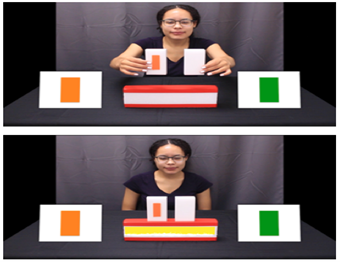Blickets
This study investigates causal reasoning in infants. Seeking explanations and uncovering the causal mechanisms behind events that we observe is possibly something only humans do, and is crucial for learning about the complex world that infants are interacting with in everyday life. We want to find out how and at what age infants start reasoning about causes and effects.
![]()
Specifically, this study investigates whether infants realise when the information that they are observing is confounded (not enough evidence to make conclusions) or not, and whether they make the correct predictions based on such observations. Because infants’ ability to act and intervene on the world is still limited, recognising these opportunities for learning is a crucial element of their developing causal reasoning skills.
Infants are shown videos in which an adult presents different objects and the effects that these objects make when placed on a music machine.

The objects that make the machine play music are sorted in one box, and those that do not make music are sorted into the other box. We then investigate whether infants understand in which situations they can find out whether a new object makes the music play or not.
To do that, we measure babies’ brain activation. The results so far show that babies do recognize when they can learn about the new object and when they cannot. We can see more activity (colour red) in the trials where babies can learn about the new object.
| Learning not possible | Learning possible |
 |
 |
In addition, we look at babies’ eye movements to see whether the babies learn and predict which box the new objects should be placed into. The data collection and analysis for this part is ongoing and we look forward to finding out how the babies’ brain activity predicts their eye movements.
|
PhD in psychology
Assistant Professor - Tenure Track
|
 |
About the study
The Blickets study has been completed.
Contact
Katarina Begus
Assistant Professor, tenure track
Centre for Early Childhood Cognition
khb@psy.ku.dk
